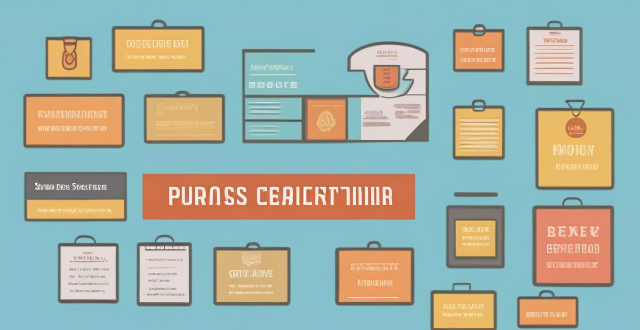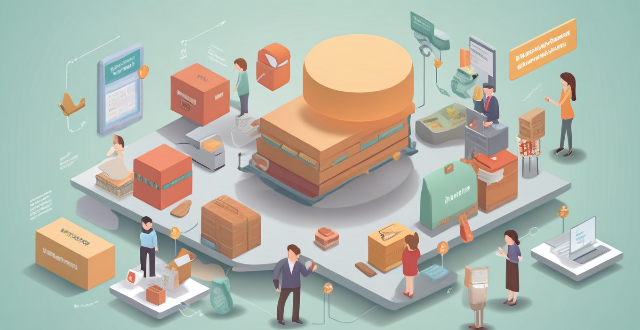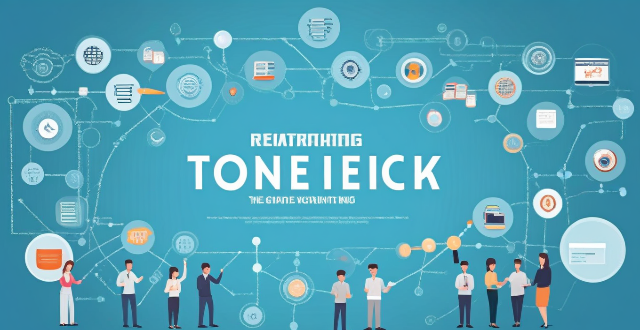Value Buying

What are the benefits of buying second-hand goods instead of new ones ?
The benefits of buying second-hand goods instead of new ones include reduced waste, conservation of resources, cost savings, resale value, supporting local economies, and promoting sustainable consumption. Buying used items helps reduce the amount of waste generated, conserves natural resources, saves money, retains high resale value, supports small businesses, and encourages a more responsible approach to shopping.

How do I avoid customs fees when buying from overseas ?
When purchasing goods from overseas, it's common to encounter customs fees, which can significantly increase the total cost of your purchase. However, there are several strategies you can use to minimize or avoid these fees altogether. Here's a detailed guide on how to do so: ## Understanding Customs Fees Customs fees are taxes imposed on imported goods by the government of the destination country. These fees are typically based on the value of the items being imported and may vary depending on the type of product and its classification under international trade regulations.### Key Points to Remember: - **Research Regulations**: Familiarize yourself with the customs regulations of the country you're importing goods into.- **Check Import Restrictions**: Some items may be prohibited or have specific requirements.- **Know the Thresholds**: Many countries have de minimis thresholds below which no customs duties are charged.## Strategies to Minimize Customs Fees### 1. Declare Lower Value Some countries offer a de minimis threshold, meaning that if the value of the goods is below a certain amount, no customs fees will be charged. Be cautious with this approach, as undervaluing goods can be considered a violation and may result in penalties.### 2. Use a Package Forwarding Service Package forwarding services allow you to ship your purchases to an intermediary address before sending them on to you. This can help by: - **Consolidating Packages**: Reducing the number of shipments can lower handling fees.- **Repackaging**: To make the package look less valuable.- **Value Declaration**: Some services may adjust the declared value to stay within de minimis limits.### 3. Shop at Online Stores That Offer Free International Shipping Many online retailers offer international shipping with customs fees included in the price or have agreements that reduce these fees.### 4. Consider Using an Import Broker Import brokers specialize in facilitating the clearance of goods through customs and can provide expert advice on minimizing fees. They have knowledge of customs laws and can assist with proper classification and valuation of goods.### 5. Check for Tax-Free Shopping Options Some countries offer tax-free shopping for tourists, which can be a way to avoid customs fees when bringing in goods personally.## Examples of Goods That May Incur Lower Customs Fees - **Personal Use Items**: Clothing, toiletries, and other personal use items often have lower customs fees.- **Unboxed or Opened Electronics**: Sometimes unboxed or opened electronics are subject to reduced customs fees.- **Gifts**: Sending items as gifts can sometimes result in lower customs fees, but this must be declared properly.## Tips for Successful Importing - **Keep Records**: Save all receipts and documentation related to your purchases.- **Stay Informed**: Customs policies can change, so stay updated on the latest regulations.- **Be Honest**: Always declare the true value and nature of your goods to avoid legal issues. By following these strategies and tips, you can effectively minimize or avoid customs fees when buying from overseas. However, always remember to comply with the laws and regulations of both the exporting and importing countries to ensure a smooth importing process.

What are some tips for successfully haggling when buying second-hand items ?
Haggling is an art form, especially when it comes to buying second-hand items. It requires a combination of research, negotiation skills, and a bit of luck. Here are some tips to help you successfully haggle and get the best deal possible: 1. **Do Your Research**: Determine market value, understand the seller's motivation, and check for flaws or issues. 2. **Develop Negotiation Skills**: Start low but fair, be polite and respectful, use silence to your advantage, and be willing to walk away. 3. **Leverage Your Position**: Offer cash upfront, bundle items, and provide a counteroffer. 4. **Finalize the Deal**: Get it in writing, inspect before paying, and ask about returns. By following these tips, you can increase your chances of successfully haggling when buying second-hand items. Remember, the key is to do your homework, remain polite yet assertive, and be ready to walk away if necessary. Happy haggling!

Are there benefits to waiting for a product to go on sale rather than buying it immediately ?
Waiting for a product to go on sale rather than buying it immediately can bring several benefits, including saving money through discounted prices and budget-friendly options. It also allows for more value through bundled deals and the potential to upgrade to newer models. Waiting helps avoid impulse buying by providing more time to decide and potentially avoiding buyer's remorse. Taking advantage of seasonal sales during holidays or end-of-season can lead to significant savings. Tax benefits may also be available in certain circumstances. Finally, waiting can ensure you get a more mature and refined version of the product as manufacturers have had time to address any initial flaws. Overall, being patient and strategic with purchases can result in numerous financial and practical advantages.

Is buying in bulk always more cost-effective, or are there exceptions ?
The text explores the concept of buying in bulk, highlighting its potential benefits and drawbacks. It notes that while bulk buying can offer cost savings, convenience, and reduced waste, it might not always be the most cost-effective strategy due to factors such as perishability, space constraints, single-use items, expiration dates, quality control, market fluctuations, and personal consumption rates. The conclusion suggests considering these factors before deciding on bulk buying to ensure it aligns with individual needs and circumstances.

How do private equity firms value companies ?
Private equity firms value companies using various methods, includingPrivate equity firms value companies using various methods, including, discounted cash flow ( These approaches help them assess the company's financial health, market position, growth potential, and risks to make informed investment decisions.

How is the value of carbon credits determined ?
Carbon credits are a valuable tool in the fight against climate change. Their value is determined by supply and demand, quality of the project used to generate them, and market conditions. Supply and demand can be influenced by government regulations, public opinion, and technological advancements. The quality of a carbon offset project can be influenced by verification and certification, additionality, and permanence. Market conditions such as economic growth, political stability, and global events can also impact the value of carbon credits.

How can we measure the value of ecosystem services ?
The article discusses various methods to measure the value of ecosystem services, which are benefits humans derive from ecosystems. These include provisioning, regulating, cultural, and supporting services. Measuring their value is crucial for informed decisions about management and conservation. Methods include direct market valuation, indirect market valuation, revealed preference methods, avoided cost method, replacement cost method, and benefit transfer method. By using these techniques, policymakers and managers can make informed decisions about resource allocation for ecosystem conservation and restoration.

How are carbon credits traded and what is their market value ?
The article discusses the trading of carbon credits, which are tradable permits allowing holders to emit certain amounts of greenhouse gases. It explains how carbon credits are traded and their market value, outlining steps in their creation, verification, issuance, trading, and retirement. It also notes that the market value of carbon credits varies based on project type, location, and demand for offsets.

What factors should I consider when buying a swimsuit for competitive swimming ?
Factors to Consider When Buying a Swimsuit for Competitive Swimming: Material, Compression, Fit, Chlorine Resistance, and Style.

How has the rise of renewable energy affected consumer preferences and buying habits ?
The rise of renewable energy has significantly influenced consumer preferences and buying habits, including increased awareness and interest in sustainability, changes in purchasing decisions towards energy-efficient products and electric vehicles, support for green initiatives, a shift towards renewable energy service providers, and adoption of smart technology.

Is it worth buying luxury goods during seasonal sales ?
Purchasing luxury items during seasonal sales can be a smart move if approached thoughtfully. Discounts, incentives, and access to newer styles are among the benefits, while quality concerns, limited selection, and impulse buying risks are potential downsides. Before investing, consider personal need versus want, financial responsibility, and do thorough research. A luxury good’s value ultimately lies in the enhancement it brings to one's life.

What are some popular online marketplaces for buying and selling second-hand items ?
Popular Online Marketplaces for Buying and Selling Second-hand Items Several online marketplaces allow people to buy and sell second-hand items, providing a convenient way to declutter homes, find unique items, and save money. Some of the most popular options include: 1. eBay - a large and well-known platform with buyer protection policies, shipping options, and payment methods. However, it charges listing fees and takes a percentage of each sale. 2. Craigslist - a free classified ads website for various categories, including second-hand items. It allows local transactions, reducing shipping costs and time delays, but lacks buyer protection policies and limited user verification. 3. Facebook Marketplace - a feature within the Facebook app that connects buyers and sellers within their community. It is easy to access and use, but also lacks official buyer protection policies and limited user verification. 4. OfferUp - a mobile app for buying and selling second-hand items locally within a community. It offers a user-friendly interface, in-app messaging, and ratings systems to help ensure secure transactions. However, it may not have as large of a user base compared to other platforms. 5. Poshmark - an online marketplace specifically designed for buying and selling fashion items, including clothing, accessories, and footwear. It offers a dedicated platform for fashion enthusiasts and features such as virtual styling sessions and social media integration. However, it focuses solely on fashion items, limiting its appeal to those looking for other types of second-hand goods. 6. Depop - a social shopping app for buying and selling unique fashion items, including clothing, accessories, and footwear. It offers a visually appealing platform with a strong emphasis on individuality and creativity, direct messaging, and ratings systems. However, it also focuses solely on fashion items and has had some reported issues with customer service and shipping delays.

How can I determine the value of a second-hand item before purchasing it ?
When considering purchasing a second-hand item, itWhen considering purchasing a second-hand item, it its value to ensure you' it's important to determine its value to ensure you're getting a fair deal. Here are some steps to help you assess the value of a pre-owned item: 1. Research the market price by checking online marketplaces, consulting auction houses, and reading reviews and forums. 2. Evaluate the condition of the item by inspecting for damage, considering age and obsolescence, and testing functionality. 3. Negotiate with the seller by making an offer based on your research and evaluation, being prepared to walk away if necessary, and asking for more information if needed.

Can you still get a good deal on a used hybrid car ?
The text discusses whether it is still possible to get a good deal on a used hybrid car, considering factors such as depreciation rates, technological advancements, fuel prices, and environmental concerns. It outlines the pros and cons of buying a used hybrid car and provides tips for getting a good deal. The conclusion states that while the market is subject to various dynamics, it is still possible to find a good deal on a used hybrid car by employing smart buying strategies.

How can I make sure I'm getting the best value for my money when shopping ?
When it comes to shopping, ensuring you're getting the best value for your money is crucial. Here are some tips to help you make informed decisions and get the most out of your purchases: 1. Research Before You Buy: Read reviews, compare prices, and check for sales and discounts. 2. Set a Budget: Determine your needs, prioritize items, and allocate funds accordingly. 3. Choose Quality Over Quantity: Invest in durable items and consider warranties and guarantees. 4. Take Advantage of Loyalty Programs: Join reward programs and use credit card rewards wisely. 5. Don't Forget About Return Policies: Understand store policies and keep receipts organized. By following these tips, you can ensure that you're getting the best value for your money when shopping. Remember to take your time, do your research, and make well-informed decisions to get the most out of your purchases.

What are the pros and cons of buying a second-hand iPhone ?
The text discusses the pros and cons of buying a second-hand iPhone. The advantages include cost savings, environmental friendliness, high resale value, and a wide range of options. However, there are also potential risks such as hidden issues, lack of warranty, outdated technology, and concerns about battery life. Ultimately, the decision to buy a second-hand iPhone depends on individual preferences and priorities.

What are some common pitfalls to avoid when buying second-hand items ?
When buying second-hand items, it's important to inspect them thoroughly for any signs of damage or wear and tear. You should also verify the authenticity of luxury items and research their value to ensure you're getting a fair price. Be wary of scams and consider the return policy before making a purchase. By following these tips, you can avoid common pitfalls and find great deals on high-quality products.

What are the taxes and duties involved in global shopping ?
Global shopping popularity has grown, but understanding the taxes and duties involved is crucial for informed purchasing decisions. Types of taxes and duties include import duty, value added tax (VAT), customs clearance fee, and excise tax. To calculate these charges, one needs to know the product category, country of origin, value of goods, and local tax laws. The responsibility for payment can be on either the seller or the buyer, depending on the transaction terms. To avoid unexpected charges, research before buying, ask for a full cost breakdown, and consider using a package forwarding service.

What are some essential factors to consider when buying secondhand items ?
When purchasing secondhand items, several essential factors should be considered to ensure the best value for money. These include the condition of the item, its price, the reputation of the seller, authenticity, age and lifespan, and safety and legality. By considering these factors, buyers can make informed decisions and avoid potential pitfalls.

How can I find reliable sources for buying and selling used goods ?
To find reliable sources for buying and selling used goods, it's essential to conduct thorough research, choose trusted online marketplaces, verify seller information, ask for detailed descriptions and photos, use payment methods that offer protection, be wary of scams, consider professional resellers, and inspect items before purchasing. By following these steps, buyers can minimize risks associated with such transactions and ensure they get the best value for their money.

How do I buy cryptocurrency ?
Cryptocurrency has become a popular investment option in recent years, but buying cryptocurrency can be a daunting task for beginners. This guide walks you through the process of buying cryptocurrency step by step, including choosing a reputable exchange, creating an account, depositing funds, buying cryptocurrency, storing it safely, and monitoring your investment. Key features to consider when choosing an exchange include security measures, fees, and user interface. After creating an account and depositing funds, you can start buying cryptocurrency by selecting the cryptocurrency you want to buy, entering the amount you want to buy, reviewing your order details, and confirming your order. Storing your cryptocurrency safely is important to prevent loss or theft, with options including hot wallets and cold wallets. Finally, monitor your investment regularly to track its performance and make informed decisions about when to sell or hold onto your cryptocurrency.

What are some tips for saving money on groceries ?
Grocery shopping can be a significant expense, but by planning meals, using sales and coupons, buying generic brands, avoiding pre-packaged foods, utilizing cashback apps, not shopping hungry, growing your own produce, buying seasonal items, cooking at home, and reducing waste, you can save money on groceries.

What strategies can I use to save money while shopping online regularly ?
Strategies to Save Money While Shopping Online Regularly includes using coupon codes and promos, taking advantage of cash-back services, price comparison, buying during sales and holidays, considering subscription services, looking for free shipping offers, avoiding impulse buying, checking return policies and warranties, reviewing purchase history, and maximizing credit card benefits.

What should I consider before buying a used car from a private seller ?
When considering purchasing a used car from a private seller, it is crucial to evaluate several key factors to ensure a successful and safe transaction. These include checking the vehicle's history for accidents and maintenance records, conducting a thorough inspection and test drive, verifying legal aspects such as a clean title and valid registration, negotiating a fair price, completing the transfer of ownership correctly, and fulfilling post-purchase steps like obtaining insurance. By attending to these details, buyers can minimize risks and enjoy their new vehicle with confidence.

What are some common mistakes people make when shopping at a brand sale event ?
When shopping at a brand sale event, it's important to avoid common mistakes such as not doing research beforehand, ignoring the return policy, buying on impulse, not trying things on, and forgetting about coupon codes and discounts. By being prepared and sticking to a plan, you can make the most of your shopping experience and avoid overspending or buying items you don't really need.

Do all merchants accept团购优惠 (tuan gou youhui) ?
Group buying (Tuan Gou) is a popular e-commerce model offering discounted goods and services through online platforms. While not all merchants accept group buying discounts, most major platforms and many businesses participate to remain competitive and meet consumer needs. The development trend of group buying shows it will continue to be an important part of e-commerce in the future.

How do I buy and sell cryptocurrency ?
This guide provides a step-by-step process for buying and selling cryptocurrency, including choosing a reliable exchange platform, creating an account, funding the account, buying and selling cryptocurrency, and withdrawing funds. It also emphasizes the importance of research and caution in this potentially lucrative investment opportunity.